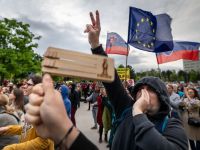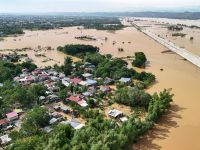The UN General Assembly on Thursday passed a non-binding resolution calling for observers in the occupied territories that had been vetoed by the United States less than one week ago in the Security Council.
The Palestinian-sponsored resolution, debated in an emergency session demanded by the Arab League and the non-aligned movement, passed by an overwhelming majority.
An earlier version of the text had been torpedoed early Saturday in the Security Council by the United States, which said it ignored facts on the ground, particularly a recent spate of deadly Palestinian bombings in Israel and the territories.
The resolution passed with 124 nations voting in favor and six voting against, including the United States, Israel and four small Pacific islands. Twenty-five nations, Great Britain among them, abstained.
The body also passed a separate resolution condemning Israeli settlements in the territories, including Jerusalem, calling them illegal and an obstacle to peace.
This resolution passed by a vote of 133 in favor, four against, and sixteen abstaining.
"The Israeli occupation of our land and our people remains the main predicament and the origin of all the disasters," said Nasser al-Kidwa, permanent Palestinian observer to the United Nations, who also accused Israel of "state-sponsored terrorism."
"The only solution for the situation we are in is an end to the occupation and the realization of the rights of our people."
Israel, for its part, chided Palestinian leader Yasser Arafat for a policy of "duplicity and deceit and evasion."
"It is repeatedly claimed that the root of the conflict in our region is the occupation," said Aaron Jacob, Israel's deputy permanent representative to the United Nations.
"But with the images of murdered and maimed Israelis filling television screens on a daily basis, any objective observer would be forced to acknowledge that terrorism is the immediate and central obstacle to peaceful dialogue."
Arab Foreign Ministers Meeting
Arab foreign ministers meeting in Cairo on Thursday expressed their "support" for the decision of Palestinian leader Yasser Arafat to call for a halt to armed operations against Israel.
They also said they would "boycott" Israeli Prime Minister Ariel Sharon for his isolation of the beleaguered Arafat, but set aside calls to cut all ties with Israel.
Ministers and other representatives of the 22 states of the Arab League, expressed their support in a final communique "for the position of the Palestinian Authority, that is looking to achieve a political solution based on the creation of an independent Palestinian state, sovereign and with its capital Jerusalem."
Moderate Arab countries including Egypt and Jordan have expressed their full support for the appeal made by Arafat to cease attacks and armed operations against Israel, but others, including Syria, have criticized his decision.
After eight hours of debate, the Arab ministers also called upon "the Palestinian people, with all their factions and organisations, to reinforce national unity in face of the great danger that threatens it," in a reference to the conflict that pits Arafat against movements such as Hamas.
However, unlike statements from all other Arab meetings since the Palestinian uprising began in September 2000, the final communique did not make a single mention of the intifada.
The ministerial meeting also decided to boycott Sharon, as long as he does the same to Arafat, who remains under virtual house arrest and surrounded by tanks in the West Bank town of Ramallah.
"As long as Sharon does not see in Arafat as a party in the peace process, the Arab countries do not see in Sharon a credible party with whom one can participate in making peace," the ministers decided.
The Arab ministers finally affirmed "their refusal of the (US) lists concerning the Palestinian and Lebanese resistance and considers that these lists have no legitimacy," a reference to a US list of groups accused of practicing terrorism which notably includes Hamas and the Lebanese Hizbollah.
This position taken by the ministers corresponds to a demand expressed during the meeting by Syria.
However, language included in a Syrian draft communique calling on Arab countries to "reactivate the boycott of Israel, on all levels" and on the "next Arab summit to take a decision recommending that Arab countries which maintain relations with Israel permanently suspend ties in all areas," did not make it into the final statement.
Egypt and Jordan signed peace treaties with Israel in 1979 and 1994, respectively.
In the course of the meeting, Palestinian delegates announced that the Palestinian Authority aims to address the United Nations to obtain "international protection for the Palestinian people," following a US veto of an Arab resolution containing calls for a "monitoring mechanism" to "help create a better situation" in the Palestinian territories.
On the sidelines of the meeting, the Palestinian representative to the Arab League Mohamed Sobeih repeated earlier calls for Arab states to increase their monthly aid to the Palestinians by 10 million dollars to 55 million.
The ministers however affirmed "the need to continue the monthly aid decided for the Palestinians until the next Arab summit" expected in March.
"Any increase in aid should be approved by heads of state," Mussa said.
Arafat, who has almost all his means of travel destroyed by the Israeli military, was absent from Cairo and represented by the chief of his political department, Faruq Qaddumi. (AFP)
© 2001 Al Bawaba (www.albawaba.com)







